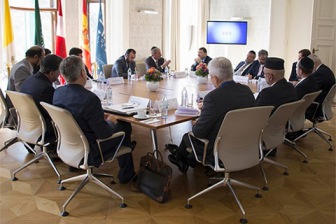In late August, a closed-door meeting of influential Jewish and Muslim leaders in Europe took place in Vienna, Austria. The secrecy of the meeting and the lengthy coordination of the final press release, which was only recently issued, have drawn attention from journalists and experts.
Participants in the meeting included leaders with significant influence. On the Jewish side, Pinchas Goldschmidt, the president of the Conference of European Rabbis (CER), participated. The board of CER includes prominent businessmen from Great Britain, Germany, Austria, Israel and the countries of the former USSR. The Muslim side was represented by the leadership of Islamic Relief Worldwide (IRW), the largest Islamic nonprofit organization working in 44 countries and distributing about 200 million euros in aid annually.
It appears that the representatives discussed the serious challenges facing both communities as populist and xenophobic sentiments rise in Europe. Although some members of the Jewish community, who are generally aloof from religious practices, are trying to play on anti-Islamic sentiments under the guise of secularism, the consequences of such actions, such as bans and restrictions, will affect not only Muslims but also Jews (and observant Christians). For example, bans on religious clothing in public institutions apply not only to hijabs but also to yarmulkes and headscarves worn by observant Jews; the ban on ritual slaughter of animals affects not only halal but also kosher practices, and so on.
As representatives of religions in which faith is inseparable from everyday life, observant Muslims and Jews face common challenges in post-Christian secular societies and, in theory, have an interest in working together to counter militant secular and xenophobic forces. The question remains, however, whether Jewish authorities can influence those fellow Jews who are actively fomenting anti-Islamic sentiment in Europe and Russia without considering that they themselves may become targets in the future.

